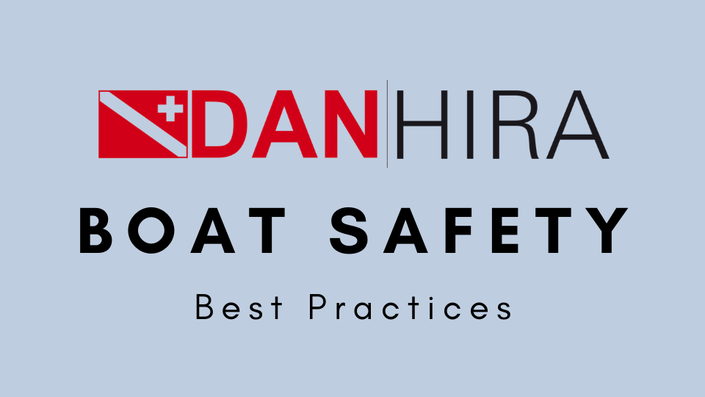Frequently Asked Questions
What is HIRA?
The DAN Hazard Identification and Risk Assessment (HIRA) program is a direct adaption of the institutional safety programs used in healthcare and aerospace. It is designed to teach you to identify risks and hazards that affect you, your staff, your customers and your business before they can cause an injury or loss. The goal of the program is to teach you to evaluate yourself, whether you have been in business for three years or three decades. The program gives you tools to assess your business and address new hazards or risks you may have overlooked and fix commonplace issues that may put you at risk.
What do I stand to gain from the HIRA program?
Even dive professionals who do not have brick-and-mortar facilities to contend with still face numerous hazards both in and out of the water. Being able to identify problems with operations, liability management and even customers is crucial to professionals' ability to protect themselves and their students and operate successfully. Dive professionals still face risks from teaching, transporting equipment and students, running or organizing charters and many other necessary aspects of a dive business. These concerns are frequently overlooked, and they put dive professionals in harm's way. The DAN HIRA program was designed to remedy that and keep you safe while you teach and protect your students. As a dive operator, the HIRA program will introduce you to entirely new fields of risk management and liability. Organized risk management, as seen in aerospace and healthcare, has not been adopted in the diving industry, even though the same types of lawsuits and losses occur. Risk is everywhere in the dive industry, and it's easy to take that for granted or overlook the hazards. As operators and as people responsible for the safety of our employees and customers, that is something we cannot afford. The DAN HIRA program is one way for us to check ourselves and make sure that we are not taking safety for granted. Absence of accidents does not necessarily indicate safety.
Does the HIRA program cost anything?
The DAN HIRA program was designed to help the dive industry thrive, reduce businesses' losses and prevent injuries. The dive industry cannot survive without its professionals, and improving dive safety cannot be limited to just recreational divers. It is provided at no cost to DAN Pro and Business Members as a proactive way of promoting safety in our communities and keeping our industry thriving.
I've been in business for decades without issues, why should I consider risk mitigation now?
A history of safe and successful operation is a good indication that your business is healthy and well run, but it does not mean that you are not at risk. Risk will always exist, despite all best efforts. DAN's HIRA program allows you to take a second look at your operation with a critical eye and an extensive set of criteria. It's all too easy for even the most experienced among us to become complacent and overlook old hazards or new risks that have arisen. Going through the program may reinforce that your risks are well managed, but the process is at least as valuable as its, result and you'll be able to set a baseline by which you can measure future hazards and operations.
Will HIRA affect my insurance rates?
Whether formalized risk management programs such as the DAN HIRA program will affect your insurance rates directly depends on your insurance provider, but reducing claims individually and as an industry will result in a downward trend in insurance rates and may thus benefit both you and the industry at large. Additionally, the program can help reduce the risk of litigation, or liability in a potential lawsuit.
What are the top risks for most shops?
Every operation is unique, but incident and loss data from across the industry shows that a small number of hazards consistently cause problems. Below are the most common hazards seen in operations of all types: Carbon monoxide contamination Hazardous tank filling procedures Lack of written and practiced emergency action plans Fear of or lack of training in identifying customers who are a hazard to themselves and refusing service.
What EAP's are most important for my business, and how should I present then in my shop?
EAPs are unique to specific businesses and operations. There are very few EAPs that apply to every operation, and the individual plans must be created with a specific business in mind. Once a HIRA level is completed, you will have a better idea of the risks your operation faces and will be best able to create the EAPs your operation requires.
How long does it take to complete the DAN Dive Boat Safety Best Practices course?
This 30-minute course is tailored to meet the specific needs of boat captains, dive professionals and operators preparing their businesses for upcoming dive activities. The material in this course should be familiar and serve as a reminder of important aspects of maritime safety to help you stay compliant with relevant USCG regulations.
Each module should take approximately 5 minutes to complete. At the beginning and end of each section you’ll find a brief introduction and summary of key points to keep you on track
What does the the DAN Dive Boat Safety Best Practices course entail?
This program is designed to assist you in understanding and implementing the essential recommendations of the 2018 United States Coast Guard (USCG) Marine Safety Advisory as it relates to dive boat operations.
What do I get after completing the Dive Boat Safety Best Practices course?
Upon completion of this course, you will be able to access all cited documents and other useful accessory tools on the “Overview” page. You will also receive a certificate of completion.

